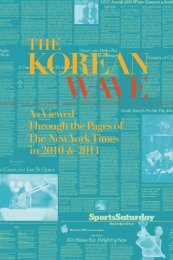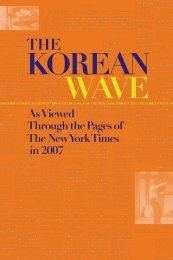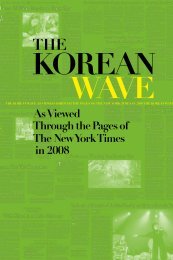The Korean Wave 2006 - Korean Cultural Service
The Korean Wave 2006 - Korean Cultural Service
The Korean Wave 2006 - Korean Cultural Service
You also want an ePaper? Increase the reach of your titles
YUMPU automatically turns print PDFs into web optimized ePapers that Google loves.
52<br />
But he played on, an electric guitar strapped across his<br />
left shoulder, going through, with increasing confidence,<br />
the rock classics that would be his epitaph. As he neared<br />
the end of the first set, he sang two of his most famous<br />
songs, “Beauty” and “Beautiful Rivers and Mountains,”<br />
and the television screens showed the pleasure on his face<br />
as the crowd clamored for more.<br />
Five days after the concert, Mr. Shin was recovering at his<br />
new house in a rural area south of Seoul. Facing farmland,<br />
his two-story brick house was built around a small studio<br />
cluttered with computers, sound equipment and costumes.<br />
“I was out of my mind for a few days,” Mr. Shin said, explaining<br />
that the concert had exhausted him. Several concerts<br />
were left, though thankfully, they were spread out.<br />
Mr. Shin was born in Seoul during the Japanese occupation,<br />
and spent his childhood listening to his father’s 78<br />
r.p.m. records and his mother’s harmonica. After both<br />
parents died, he began working at age 11, delivering<br />
pharmaceutical goods and saving up money to pursue<br />
what he believed was a destiny in music.<br />
As he entered his late teens in the years after the <strong>Korean</strong><br />
War, resources were few in South Korea. He bought a<br />
violin – “because it was the only instrument in the music<br />
store” – but found it too difficult to learn and eventually<br />
turned it in for an acoustic guitar. A friend gave him<br />
the money to buy an electric guitar, which gave him entry<br />
into the only place <strong>Korean</strong> musicians could perform<br />
regularly: American military bases.<br />
Mr. Shin played jazz in the officers’ club, sang country<br />
for the sergeants and rock ‘n’ roll for the troops. He mimicked<br />
an American accent so well that the soldiers – who<br />
would shout, “We want Jackie!” – mistakenly believed he<br />
was fluent in English. At the base, he ate fried chicken<br />
and drank Dr Pepper. He met his future wife, Myeong<br />
Jeong-gang, who was Korea’s first female rock ‘n’ roll<br />
drummer in a band called Blue Ribbons.<br />
“<strong>The</strong> music we played shouldn’t taste like kimchi,” Mr.<br />
Shin said of the spicy pickled vegetable that is the <strong>Korean</strong><br />
national dish, “but it should ooze butter.”<br />
Around the same time the Beatles scored their first hits in<br />
the United States, Mr. Shin formed the first <strong>Korean</strong> rock<br />
band, “Add 4,” in 1964. Influenced by the Beatles and<br />
Jimi Hendrix – he is often compared to both, the Beatles<br />
for his songwriting and Hendrix for his guitar playing<br />
and lone-wolf style – he wrote a series of classic hits and<br />
began the careers of other artists with his songs.<br />
But at his peak, one morning in 1972, a fateful phone<br />
call would derail his career. A caller identifying himself<br />
as an official in the presidential Blue House asked Mr.<br />
Shin – in a “tone that was not unpleasant” – to write a<br />
song for Park Chung-hee, South Korea’s military ruler<br />
from 1961 to 1979. Mr. Shin declined “in a nice way,” he<br />
said. But 10 minutes later, another caller, this time from<br />
Mr. Park’s political party, gave him an order. Again, he<br />
refused. Politics had never interested him, he said, and<br />
he simply hated the military dictatorship.<br />
His refusal, he believed, eventually led to his imprisonment<br />
for drug possession. American hippies protesting<br />
South Korea’s participation in the Vietnam War had introduced<br />
Mr. Shin to marijuana and LSD, which he said<br />
he took for a while, but quit because it interfered with<br />
his work. <strong>The</strong> hippies went back to the United States,<br />
Mr. Shin said, but left a huge quantity of marijuana at<br />
his home. South <strong>Korean</strong> musicians, interested in experimenting,<br />
came to him.<br />
After four months in prison, Mr. Shin found that the<br />
government had banned his songs, a ban that was lifted<br />
only after Mr. Park was assassinated in 1979. Clubs<br />
started offering him gigs again. But by then disco had<br />
supplanted his style of music, young waiters told him to<br />
play faster, and he was considered out of fashion.<br />
It was only in recent years that his music was rediscovered,<br />
and young musicians recorded covers of his songs<br />
in “A Tribute to Shin Joong-hyun.”<br />
A South <strong>Korean</strong>, who is a little bit the Beatles<br />
and a little bit Jimi Hendrix, takes a bow.<br />
<strong>The</strong> lost years, though, have added a bitter edge to Mr.<br />
Shin, who never raked in the big money that goes to<br />
Western rock stars. He makes about $10,000 a month<br />
now, and complains that he is being cheated.<br />
He describes current popular music as “demented.” Like<br />
many in his generation, Mr. Shin remains fiercely pro-<br />
American and rails at the youth’s misgivings and criticisms<br />
about America.<br />
“Young people don’t know anything,” he said. “<strong>The</strong>y’re<br />
pathetic. It’s because of the U.S. we have what we have.”<br />
At the concert here, however, Mr. Shin basked in his fans’<br />
embrace. “We love you,” said Chang Young-woo, 46, a<br />
restaurant manager, adding, “When I listen to his songs,<br />
I feel as if I’m a high school student again.”<br />
After the concert, Mr. Shin patiently signed autographs.<br />
But something, it seemed, was ruffling him. At a postconcert<br />
party, he was feeling “exhausted” and in no mood to<br />
drink or eat. His manager had booked a hotel here. “But I<br />
didn’t feel that I could sleep,” Mr. Shin said, “so I decided<br />
to go back to Seoul.” He drove alone on the main highway<br />
to Seoul, but he soon started running out of gas.<br />
“At that hour, there were no gas stations on the highway that<br />
were open,” he said, “so I had to get off the highway and<br />
search for an open gas station. I was running out of gas.”<br />
It seemed to take ages before he found a station and was<br />
able to get back on the highway. Dawn was about to<br />
break when Mr. Shin at last made it home.<br />
53<br />
Copyright © <strong>2006</strong> by <strong>The</strong> New York Times Co. Reprinted with permission.





